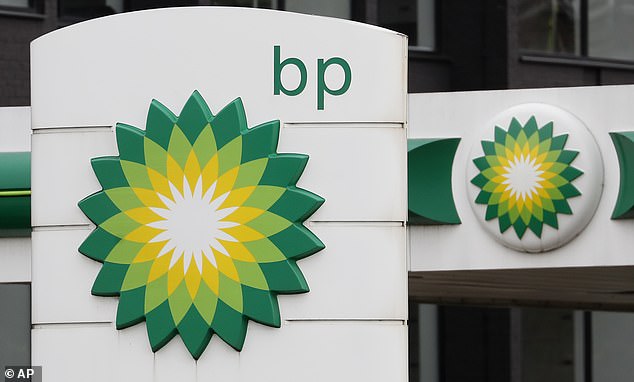After the BP dividend cut, where is there left to look for the income-hunting investor?
BP shareholders who rely on dividend payments from their investments will see their income slashed after the oil giant halved the profits it pays out.
It is the first time the BP has cut its dividend in a decade and follows a string of similar moves from companies seeking to protect themselves from the pandemic.
BP generates the largest dividend payout among the blue chip FTSE 100 giants and experts say the firm will remain one of the largest payers this year, despite the cuts. Investors can still expect returns of around 20p per share, a yield of 6.7 per cent.
BP traditionally generates the largest dividend payment among the big blue chip FTSE 100 giants and experts say the firm will remain one of the largest payers this year despite the cuts
Laura Suter, personal finance analyst at AJ Bell, says other FTSE 100 options include Aviva, which has a forecast yield of 11.7 per cent and M&G at 11.5 per cent.
But she adds these may be overly optimistic and notes BP’s initial forecast yield was 10.6 per cent.
BP’s move came as it posted a record £5.2 billion ($6.7 billion) quarterly loss, after a drop in the demand for oil. The firm has announced it will cut 10,000 jobs, with as many as 2,000 at risk in the UK.
Many companies are seeking to hang on to cash reserves by slashing dividends.
Banks have cancelled them altogether and Shell made its first dividend cut since World War II in April, reducing the quarterly payouts by two-thirds.
Link Group’s Dividend Monitor shows dividends fell by 57 per cent in the second quarter of the year as 176 companies cancelled payouts and 30 more have cut them.
Ms Suter says investors could look at firms with track records of dividend growth, such as industrial equipment rental company Ashtead, which has delivered a compound annual growth for its dividend of 29 per cent over the past ten years.
Adrian Lowcock, of investment firm Willis Owen, says investors should look at diversifying their portfolio in the UK and consider funds such as Threadneedle UK Equity income, whose holdings include AstraZeneca and GlaxoSmithKline, as well as supermarket Morrisons.
